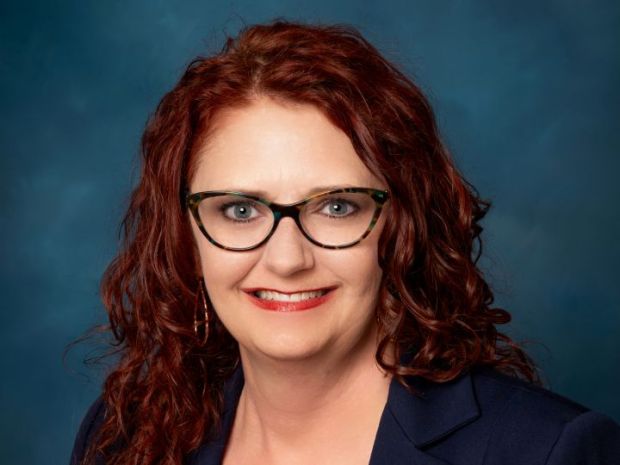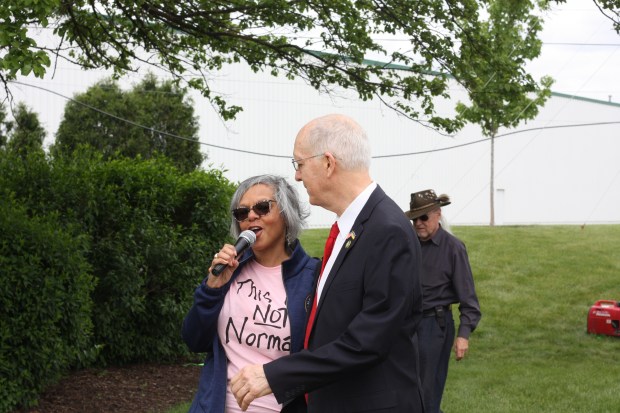Three candidates, two of whom are incumbents, are vying in the Nov. 5 election to fill two seats representing Will County Board District 10, which includes parts of the Naperville and Aurora areas.
The district is currently represented by Democrat Meta Mueller, of Aurora, and Republican Julie Berkowicz, of Naperville, who are seeking reelection. Wheatland Township Board Trustee Kelly Hickey, a Naperville Democrat, is the third candidate hoping to land one of the four-year terms.
KELLY HICKEY
Party: Democrat
Hometown: Naperville
Age: 57
Education: Some college
Experience: Wheatland Township Board trustee, 2021-present
Family: Married, two sons

META MUELLER
Party: Democrat
Hometown: Aurora
Age: 50
Education: Some college
Experience: Will County Board, 2018-present; Democratic majority leader, 2019-22; president. Forest Preserve District of Will County Board, 2022-23; chair, Capital Improvements Committee, 2022-present
Family: Married, one daughter

JULIE BERKOWICZ
Party: Republican
Hometown: Naperville
Age: 63
Education: Some college
Experience: Will County Board, 2018-present; chair, Legislative Committee, 2022-present; board member of Riverwalk Adult Day Services and OPUS Chamber Music; past board member, Knoch Knolls Homeowners Association
Family: Married, three sons
This is what the candidates had to say about current county issues:
Mental health
Mueller said while serving as the past Democratic majority leader, she helped the county board allocate federal pandemic funds, which supported municipalities, health agencies, townships, libraries, fire departments and businesses countywide. Through the process, she said she saw how multi-layered some of the problems can be. The county split their $134 million allocation between several categories to support health care, economic development, infrastructure improvements and other needs that emerged from the pandemic.
Mueller and Hickey said ensuring there are enough mental health services for children, young adults and seniors is one of the top issues in the district.
Hickey noted that there were about $94 million in requests for pandemic relief funds under the health care category, but $17 million was approved, showing need is still there.
District 10 residents voted strongly in favor of a referendum two years ago to form a community mental health board that will support services dealing with mental health issues, intellectual and developmental disabilities and substance abuse problems, Hickey said.
The county board last year approved a $10 million levy to fund the mental health board along party lines, with Democrats in favor of and Republicans opposed to the levy. Hickey said the board should be funded without having a partisan fight.
“Access to mental health should not be determined by your ZIP code,” Hickey said. “This was voted on by the taxpayers. To not fund it is to find a back door way to undo the will of the people.”
Berkowicz said that having a separate mental health board is not necessary when the Will County Health Department provides mental health services and works with existing organizations. The county board supports the health department, she said, while the mental health board has no accountability to the county board. She said 6% of the mental health board’s budget was spent on administration and legal fees.
“We don’t need to establish an additional board and create duplicity and a new tax levy,” Berkowicz said. “Taking money from the taxpayer doesn’t solve the problem.”
Mueller said voter input was sought when creating the mental health board, and it was frustrating that Republicans were ignoring the will of the voters. District 10 residents have said that access to mental health services is one of their main concerns, and she wants to work to expand access to affordable mental health services, she said.
Solar energy
Berkowicz, chair of the board’s legislative committee and vice-chair of the land use and development committee, said one of the issues the county has been facing lately is a large number of applications for solar farms, especially in the rural areas.
State legislation, which requires the board to permit solar energy farms as long as they meet state statues, takes away the voice of the people, she said. Elected officials can continue to communicate with their state legislators their concern about lack of local control, she said. Other counties throughout Illinois have similar concerns, she said.
While she supports solar energy in an industrial zone, she is concerned about the loss of farmland and that many neighbors never imagined they would be surrounded by solar panels, Berkowicz said. Supporting the agricultural economy is important to her, she said.
“When you lose farmland, you will not get it back,” she said.
Hickey said it would be difficult to listen to public comment while being handcuffed by state law. The rights of the farmers, who are also trying to sell or lease their property, should also be taking into consideration, she said. Approval of solar farm is a balancing act between state guidelines, the will of the community and the rights of the property owners, Hickey said.
Mueller said she is supportive of renewable energy but understands why municipal officials and neighbors are upset.
“I feel the state should take back control,” she said. “Why bother having us vote on it if we can’t say no.”
Top county issues
Hickey, who works with seniors, individuals with disabilities and transportation issues on the Wheatland Township Board, said improving transportation is an important issue to her. She would like to strengthen programs, such as Access Will County, which provide seniors and individuals with disabilities transportation to medical care, stores, work or community events. As a parent of an adult son with autism and founder of a nonprofit group that helps individuals with disabilities find employment, Hickey said she understands the importance of access to transportation for one’s independence.
Mueller, current chair of the board’s capital improvements committee, said she was proud to see projects such as the Renewable Natural Gas plant in Wilmington and the new county morgue come to fruition. The county board will next consider creating a veterans-centric complex on county-owned property in Joliet, she said. Her career background in commercial property management has made her a good fit to lead the capital improvements committee, and she looks forward to the renovation of a former Silver Cross Hospital medical professional building to use for veterans services, she said.
“I think we can all agree we want as much services as possible for our veterans,” Mueller said.
It is also important to ensure the county’s roads and infrastructure are maintained, she said.
Berkowicz said one of her main concerns is keeping property taxes low. Constituents have expressed their concerns not only at the cost of property taxes but of groceries and energy prices.
“I’ve talked to neighbors all over the district,” she said. “People are struggling. Property taxes are a big part of it.”
She also is concerned about congestion and overdevelopment and wants to ensure the county maintains open space, Berkowicz said. Open space contributes to residents’ overall quality of life, improved mental health and brings taxpayers’ financial relief because it doesn’t require as much funding to maintain, she said.
Politically split board
Since the 2022 election, the Will County Board has been split evenly with 11 Democrats and 11 Republicans representing the county. The board districts have staggered two- and four-year terms based on a random draw. In addition to District 10, voters on Nov. 5 also will choose representatives in districts 6 and 7, which include parts of Joliet, Plainfield and Shorewood, so the election could change the political dynamics on the board.
Berkowicz said she represents everyone in the county, regardless of political party. Split votes are often based on policy differences, she said, and she can work with all board members regardless of party.
“To me, we are all part of a team,” she said.
Mueller said the split board has been difficult at times.
“We have faced a lot of gridlock due to debates over national issues that don’t belong on the county board,” Mueller said, citing a recent proposal by board Republicans to declare the county a non-sanctuary county.
Mueller and the rest of the Democrats rejected the resolution in July, saying it was divisive and meaningless. Immigration reform is a national issue and not something the county board can control, they said.
Mueller said another example was when the board in 2023 had to remove its proclamation to recognize Pride Month from its agenda after Republicans wanted to also recognize Moms for America, which has spoken out against the LGBTQ community and is listed by the Southern Poverty Law Center as a hate and antigovernment group. The board earlier this year voted to remove proclamations entirely from its agendas because they’ve caused division.
Hickey said one of the reasons she decided to run for the board was to encourage more civility between members. She said there seems to be too much partisan divisiveness that waste’s the board’s time and taxpayer money.
Michelle Mullins is a freelance reporter for The Courier-News.





